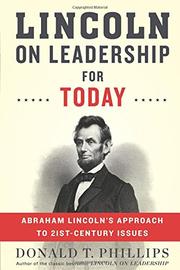

LINCOLN ON LEADERSHIP FOR TODAY
Abraham Lincoln's Approach to Twenty-First-Century Issues
by Donald T. Phillips
An author who has published frequently on leadership and leaders—from the Founding Fathers to Vince Lombardi—returns with his second book about Lincoln’s leadership (Lincoln on Leadership, 1992).
Phillips (The Clinton Charisma: A Legacy of Leadership, 2007, etc.) follows Lincoln’s professional career chronologically, from lawyer to president. After each chapter, the author offers his opinions about how Lincoln might handle the most prominent political and social issues of our day, including abortion, capital punishment, international relations, and public education. The biographical chapters are well-researched, although Phillips rarely finds anything negative to say about Lincoln. As a metaphor for Lincoln’s strength (physical and otherwise) he continually reminds us of Lincoln’s ability to balance an ax at the end of each extended arm. It’s risky business, though, yanking a character from a previous century into our own and speculating about what he or she would do. It forces us, in this case, to imagine a leader who died in 1865 sitting once again in the White House and dealing with issues in contexts that would entirely baffle him. In his “Lincoln on Leadership” sections, the author is forced, of course, to offer qualifiers like “My feeling is,” “My sense is,” and the like. Throughout, Phillips asserts that Lincoln would be a Democrat of today, supporting women’s rights, voting rights, public education, environmental protection, action on climate change, and public health care. He would, however, in the author’s view, allow states to keep the Confederate flag, permit capital punishment in heinous cases, find a “middle ground” on abortion, and keep the Electoral College. From Lincoln’s behavior, the author extracts a number of leadership principles, including the importance of incremental change and working with your opponents.
Deeply admiring biography mixed with much supposition that ranges from thought-provoking to ridiculous.